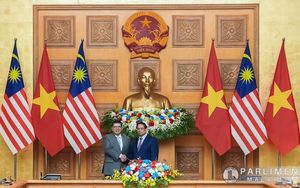The British Council's flagship conference, New Directions South Asia 2025, made its debut on February 21-22, bringing together experts from the UK and across South Asia to discuss cutting-edge innovations in English language learning and assessment. Hosted for the first time in New Delhi, this significant event attracted participants from Bangladesh, India, Nepal, Sri Lanka, and Pakistan, marking a pivotal moment for English assessment in the region.
The two-day conference commenced with inspiring remarks from senior representatives of the British Council, including Professor Barry O'Sullivan OBE, the Director of English Language Research. He delivered the keynote address themed "Technology and tradition: The changing face of assessment in English language learning systems," highlighting the role of English as not just a functional language but as one driving aspirational educational and career goals globally.
According to the British Council, their extensive expertise in delivering high-quality English language services and examinations positions them uniquely to support South Asia's knowledge ambitions. Professor O'Sullivan reiterated the conference's significance, stating, "The launch of New Directions in South Asia marks a significant milestone... meaningful dialogue on the intersection of technology and tradition."
The conference provided a unique opportunity for policymakers, educators, academics, teachers, and assessment experts to address the challenges and changes facing English language assessment and learning. Held concurrently with events across multiple countries, including livestreaming from the British Council’s Colombo office to local attendees, it emphasized collaboration among regional thought leaders.
Orlando Edwards, the British Council's Country Director for Sri Lanka, expressed enthusiasm for the event's success, saying, "It was inspiring to see this landmark conference come to life... empowering the wider South Asian region to compete, collaborate and thrive on the world stage." This sentiment echoed the commitment of the British Council to strengthen educational infrastructure and outcomes through innovative solutions.
The conference featured two plenary sessions, four panel discussions, and numerous parallel sessions drawing more than 250 attendees. These interactive forums emphasized the importance of enhancing employability through English language skills, exploring the role of artificial intelligence (AI) within English education, and implementing effective assessment strategies for young learners.
Specifically, discussions were centered around four key themes: English for employability, the integration of AI in English education, approaches to assessing young learners, and the role of English within multilingual educational contexts. Each topic addressed the growing need for effective strategies as education becomes increasingly interconnected and multilingual.
Among the notable contributions was Victoria Murphy, Professor of Applied Linguistics at the University of Oxford, who spoke on the challenges and methodologies appropriate for assessing young learners. Murphy stated, "Discussions... highlight our shared commitment to developing assessment approaches... supporting the unique needs of young language learners across the region," underscoring the necessity for frameworks to support holistic development.
The smaller New Directions event held simultaneously in Islamabad focused on the challenges and opportunities specific to the Pakistani educational environment, featuring dialogue among representatives from the Higher Education Commission, the telecom sector, the EdTech industry, and the British Council's partner schools network.
This comprehensive initiative marks the British Council's commitment to fostering dialogue on English language assessment and its relevance, ensuring materials and methods are current and effective. By convening educational leaders and stakeholders under one roof, New Directions South Asia is paving the way for progressive change and collaboration across the educational spectrum.
Now more than ever, as English remains integral to global communication and opportunity, the insights gathered at this conference are poised to influence the future of language learning and assessment across South Asia. The British Council's pledge to empower educators and learners alike continues to resonate as they navigate the realities of 21st-century education.



